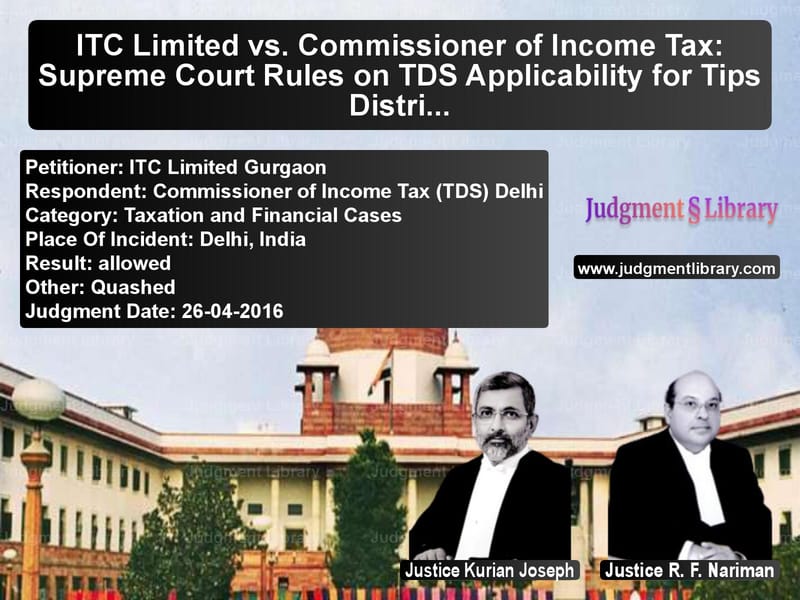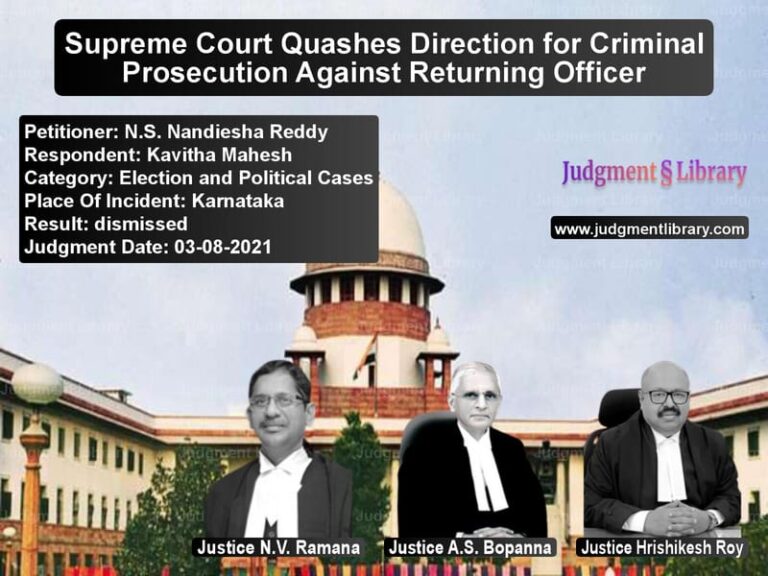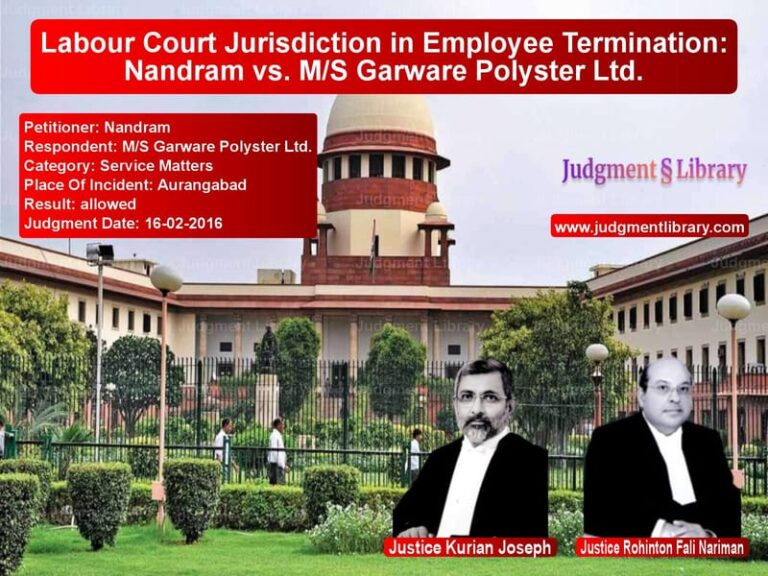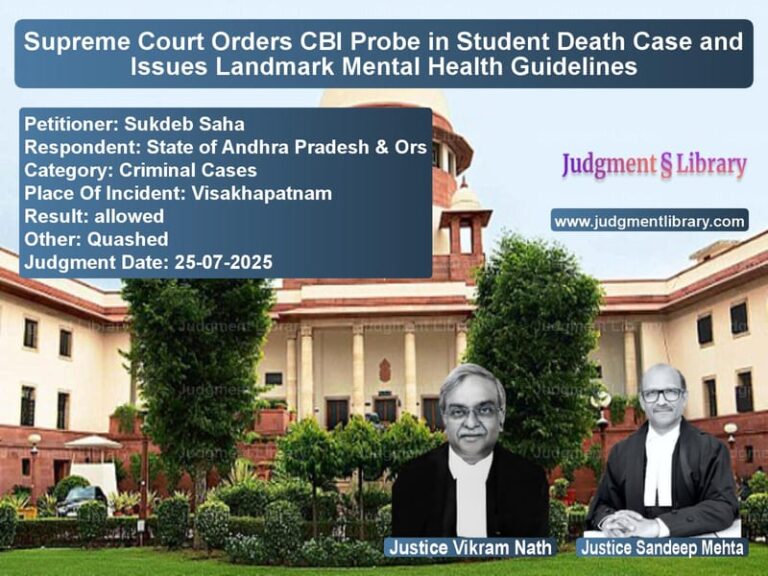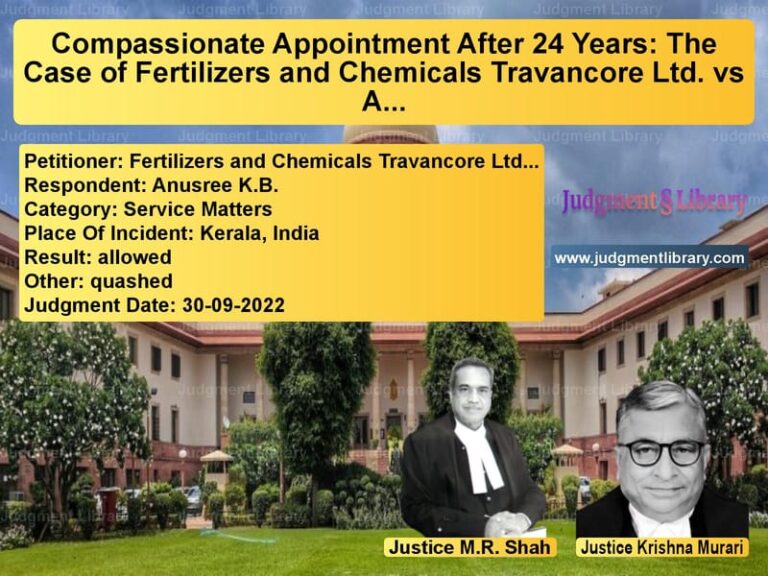ITC Limited vs. Commissioner of Income Tax: Supreme Court Rules on TDS Applicability for Tips Distributed to Employees
The Supreme Court of India, in its judgment dated April 26, 2016, ruled in favor of the appellant in the case of ITC Limited Gurgaon vs. Commissioner of Income Tax (TDS) Delhi. This case revolved around whether tips received by hotel employees from customers and subsequently distributed through their employer were subject to tax deduction at source (TDS) under Section 192 of the Income Tax Act, 1961. The apex court overturned the Delhi High Court’s decision, holding that the employer was not liable to deduct TDS on such tips.
Background of the Case
The case arose from surveys conducted at the business premises of various hotel operators, including ITC Limited, revealing that these businesses collected tips paid by customers via credit cards and distributed them to employees. The tax authorities argued that these tips should be considered as ‘income under salary’ in the hands of the employees, and thus, ITC was liable to deduct tax at source under Section 192.
The Assessing Officer treated ITC as an ‘assessee-in-default’ under Section 201(1) of the Income Tax Act for failing to deduct TDS on these payments. Additionally, interest was levied under Section 201(1A) for non-compliance.
Legal Issues
The primary legal question before the Supreme Court was:
- Whether the tips collected by hotels from customers and later distributed to employees constituted ‘salary’ under Sections 15 and 17 of the Income Tax Act, making them subject to TDS under Section 192.
- Whether ITC, as an employer, was responsible for deducting TDS on such payments.
Arguments by ITC Limited
- The hotel merely acted as a conduit by collecting the tips from customers and passing them on to employees.
- Tips were not contractual payments from the employer to the employees but voluntary payments made by customers.
- The payment of tips had no direct nexus with the employer-employee relationship.
- Tax should be deducted by the employees themselves under the head ‘Income from Other Sources’ and not by ITC as an employer.
Arguments by the Commissioner of Income Tax
- The tax department contended that since the employer collected the tips and distributed them to employees, the payment should be considered ‘profits in lieu of salary’ under Section 17(3) of the Act.
- Since the tips were routed through the employer, they became part of the employee’s salary and were subject to TDS under Section 192.
- Relying on previous judgments, the tax department argued that any monetary benefit received from an employer should be considered as salary income.
Supreme Court’s Observations
The Supreme Court analyzed the statutory framework and prior judgments and made the following key observations:
- Section 192 applies only when there is a direct employer-employee relationship with regard to the payment being made.
- Since tips were voluntary payments made by customers, the employer had no vested right over them.
- The employer was merely a trustee for distributing the money, and the contract of employment did not govern these transactions.
- The court distinguished between salary and income from other sources, concluding that tips do not form part of ‘salary’ under Section 15 or 17.
- The decision of the High Court in favor of the tax department was based on an incorrect reading of the statutory provisions.
Supreme Court’s Ruling
The Supreme Court ruled in favor of ITC Limited and issued the following directives:
- Tips received by employees from customers and passed through the employer were not taxable as salary.
- ITC Limited was not liable to deduct TDS under Section 192 on tips distributed to employees.
- The judgment of the Delhi High Court was set aside, and ITC was absolved of any liability under Section 201(1) and Section 201(1A).
Key Takeaways from the Judgment
This ruling has significant implications for the hospitality and service industry:
- Clarification on TDS Obligations: Employers are not responsible for deducting TDS on tips voluntarily given by customers and later distributed to employees.
- Recognition of Tips as Separate from Salary: The judgment establishes that tips received from customers do not fall within the definition of ‘salary’ under the Income Tax Act.
- Tax Compliance for Employees: Employees receiving tips must report them as ‘Income from Other Sources’ in their tax returns.
- Precedent for Future Cases: The ruling serves as an important precedent for similar cases involving employer-collected payments.
Conclusion
The Supreme Court’s judgment in ITC Limited vs. Commissioner of Income Tax provides much-needed clarity on the taxability of tips in the hospitality sector. By distinguishing tips from salary, the court has upheld the principle that employers cannot be held liable for TDS on amounts that do not arise from the employer-employee relationship. This ruling sets an important legal precedent, ensuring that tax authorities correctly interpret statutory provisions while assessing employer obligations.
Don’t miss out on the full details! Download the complete judgment in PDF format below and gain valuable insights instantly!
Download Judgment: ITC Limited Gurgaon vs Commissioner of Inco Supreme Court of India Judgment Dated 26-04-2016-1741854689221.pdf
Direct Downlaod Judgment: Direct downlaod this Judgment
See all petitions in Income Tax Disputes
See all petitions in Banking Regulations
See all petitions in Tax Refund Disputes
See all petitions in Judgment by Kurian Joseph
See all petitions in Judgment by Rohinton Fali Nariman
See all petitions in allowed
See all petitions in Quashed
See all petitions in supreme court of India judgments April 2016
See all petitions in 2016 judgments
See all posts in Taxation and Financial Cases Category
See all allowed petitions in Taxation and Financial Cases Category
See all Dismissed petitions in Taxation and Financial Cases Category
See all partially allowed petitions in Taxation and Financial Cases Category

